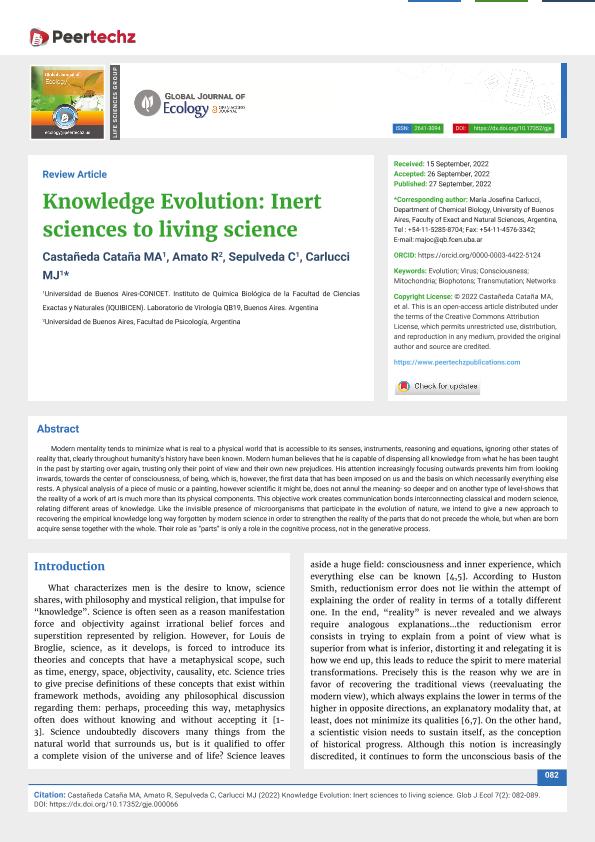Artículo
Knowledge Evolution: Inert sciences to living science
Castañeda Cataña, Mayra Alejandra ; Amato, R.; Sepúlveda, Claudia Soledad
; Amato, R.; Sepúlveda, Claudia Soledad ; Carlucci, Maria Josefina
; Carlucci, Maria Josefina
 ; Amato, R.; Sepúlveda, Claudia Soledad
; Amato, R.; Sepúlveda, Claudia Soledad ; Carlucci, Maria Josefina
; Carlucci, Maria Josefina
Fecha de publicación:
09/2022
Editorial:
Peertechz Publications
Revista:
Global Journal of Ecology
ISSN:
2641-3094
Idioma:
Inglés
Tipo de recurso:
Artículo publicado
Clasificación temática:
Resumen
Modern mentality tends to minimize what is real to a physical world that is accessible to its senses, instruments, reasoning and equations, ignoring other states of reality that, clearly throughout humanity’s history have been known. Modern human believes that he is capable of dispensing all knowledge from what he has been taught in the past by starting over again, trusting only their point of view and their own new prejudices. His attention increasingly focusing outwards prevents him from looking inwards, towards the center of consciousness, of being, which is, however, the first data that has been imposed on us and the basis on which necessarily everything else rests. A physical analysis of a piece of music or a painting, however scientific it might be, does not annul the meaning- so deeper and on another type of level-shows that the reality of a work of art is much more than its physical components. This objective work creates communication bonds interconnecting classical and modern science, relating different areas of knowledge. Like the invisible presence of microorganisms that participate in the evolution of nature, we intend to give a new approach to recovering the empirical knowledge long way forgotten by modern science in order to strengthen the reality of the parts that do not precede the whole, but when are born acquire sense together with the whole. Their role as “parts” is only a role in the cognitive process, not in the generative process.
Palabras clave:
EVOLUTION
,
MITOCHONDRIA
,
VIRUS
,
TRANSMUTATION
Archivos asociados
Licencia
Identificadores
Colecciones
Articulos(IQUIBICEN)
Articulos de INSTITUTO DE QUIMICA BIOLOGICA DE LA FACULTAD DE CS. EXACTAS Y NATURALES
Articulos de INSTITUTO DE QUIMICA BIOLOGICA DE LA FACULTAD DE CS. EXACTAS Y NATURALES
Citación
Castañeda Cataña, Mayra Alejandra; Amato, R.; Sepúlveda, Claudia Soledad; Carlucci, Maria Josefina; Knowledge Evolution: Inert sciences to living science; Peertechz Publications; Global Journal of Ecology; 7; 2; 9-2022; 82-89
Compartir
Altmétricas



